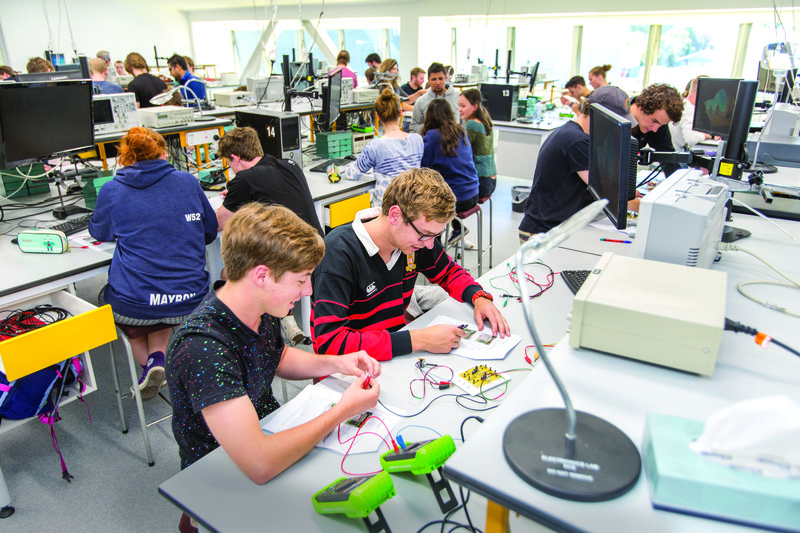4 Mar 2019
Online, open plan, blended learning – the way engineering’s being taught has changed alongside a changing industry. But are today’s graduates ready for the real world?
It wasn’t like that in my day.
It’s a well-worn line, but reflecting on changes in the way engineering’s being taught today, it’s likely to ring true for all but the most recent graduates.
Professor Gerard Rowe CMEngNZ, Deputy Dean of the Faculty of Engineering at the University of Auckland, says one of the biggest changes in the engineering industry is the type of employers.
“Forty years ago, most of our graduates would go into large infrastructure companies like the New Zealand Post Office, the New Zealand Electricity Department, New Zealand Railways and the Ministry of Works.”
Now, there’s a far wider range of employment opportunities and the University prepares graduates for three different streams of work: infrastructure, manufacturing – requiring an innovative approach as New Zealand can’t compete with bulk offshore manufacturing – and “non-engineering activities”. Engineering graduates are keenly sought for the latter roles because of their excellent team work, problem solving and communication and analysis skills.
“Such graduates might go and work for merchant banks, for companies like McKinsey or non-government organisations.”
A 35-year veteran of the University’s teaching staff, Gerard acknowledges it’s a big shift from when he was a student. These new career streams require a curriculum that touches on a broad spectrum of areas.
“Any one of those sectors might look at our curriculum and say: ‘you haven’t got as much as we would like in this area’. That’s because there’s only so much you can do in four years and you’re trying to cover all of those potential employment groups.”
The University responds to the changing nature of engineering in part by introducing new programmes. In addition to the long-standing trio of civil, mechanical and electrical engineering, it offers chemical and materials engineering, engineering science, biomedical engineering, mechatronics, computer systems engineering and software engineering, with an additional new specialisation planned.

Students building and testing amplifier circuits in the new Electronics Laboratory at the University of Canterbury.
New teaching tricks
It’s clear that teaching and learning styles are changing.
“It used to be that learning was first about getting privileged access to esoteric information, and then knowing what to do with it,” says University of Canterbury College of Engineering Academic Dean, Dirk Pons FEngNZ CPEng IntPE(NZ).
If anything, now there’s too much information available online, Dirk says, and learning’s more focused on problem solving and application. Lecturing is now less about pushing information at students and more about motivating them and helping them develop knowledge and skills.
While maths and engineering sciences remain fundamental, course changes include more emphasis on the interaction between engineers and society, Dirk says. There’s increased coverage of professional ethics, environmental impacts, health and safety and biculturalism, including incorporating a Māori worldview into engineering projects.
Gerard Rowe says the primary reason teaching and learning methods have changed in recent years is due to “the ubiquity of internet access”.
“The lecturer is no longer the sole source of information.”
Teaching has moved away from students sitting in large lecture theatres to incorporating digital technology and the provision of online resources and recordings.
But with increased online learning comes new dangers.
“It requires students to take ownership of their own learning, to have done the pre-reading and activities so that they’re well-equipped to participate fully in class,” says Gerard.
If anything, now there’s too much information available online, and learning’s more focused on problem solving and application.
He says the danger is that almost all the engineering courses are concept based.
“In leading students through that, you need to be sure that you create activities to help them master these concepts and you need to do that in the correct order.”
A mixed, or blended, learning approach is needed, including authentic, engaging, hands-on activities to help students master concepts.
But while today’s students might be so-called digital natives, that’s not so for much of the teaching staff.
“We’ve really reached a point where it’s clear that someone like me, a subject matter expert, can no longer be expected to do it all on their own,” says Gerard.
Enter learning designers, the first of which has recently joined the University of Auckland’s Engineering faculty. These are education experts who can identify and leverage online learning opportunities.
Tertiary institutions are also changing their physical environments to align with new styles of teaching and learning. New buildings favour flexible spaces that are rapidly reconfigurable for lecturing, group work and conducting experiments.
But is Big Brother coming to a university near you? Perhaps, but the intentions are good.
The University of Auckland wants to use technology to check whether students have logged on to a learning management system, accessed resources and opened lecture recordings.
“Armed with that sort of information we can at least categorise students and can identify early those who are at academic risk and reach out to them,” Gerard says.
Engineers as leaders
The University of Auckland includes professional development throughout its Engineering degree, but Gerard acknowledges there needs to be more focus on training engineers to be leaders.
“We’re feeling quite uncomfortable that over the last 20 or so years we’ve seen a decreasing number of engineers in positions of influence in large companies than was previously the case.”
For instance, in the past, the Chief Engineer of the New Zealand Post Office was a very significant role, Gerard says.
“If you look at what those infrastructure companies have become, engineers aren’t necessarily in such key leadership roles. We are certainly mindful of the need to provide experiences which will equip our graduates to become leaders no matter which of the industrial sectors they actually finish up in.”
“Students are the same as they’ve always been”
The University of Auckland includes professional development throughout its engineering degree, but Gerard acknowledges there needs to be more focus on training engineers to be leaders.
“We’re feeling quite uncomfortable that, over the last 20 or so years, we’ve seen a decreasing number of engineers in positions of influence in large companies than was previously the case.”
For instance, in the past, the Chief Engineer of the New Zealand Post Office was a very significant role, Gerard says.
“If you look at what those infrastructure companies have become, engineers aren’t necessarily in such key leadership roles. We are certainly mindful of the need to provide experiences that will equip our graduates to become leaders no matter which of the industrial sectors they actually finish up in.”
Students are the same as they have always been: intelligent, curious, fun-loving, sometimes lazy, occasionally doing crazy things.
Technical techniques
Polytechnics such as Ara Institute of Canterbury are also seeing changing expectations from employers and students. Head of Engineering & Architectural Studies, Dr Michael Edmonds, says the engineering industry expects graduates to have strong soft skills alongside technical skills. The Engineering & Architectural Studies Department has increased its collaboration with other programmes as a way of developing such skills, for example with engineering students having design students as “clients” for a project.
Ara, too, has created new teaching spaces to promote collaboration, including a multi-disciplinary lab for all practical Civil Engineering work.
Technical institutes attract a range of student ages, cultures and backgrounds and Ara has worked to make classes more inclusive. Michael says one third of Ara’s Engineering students are international, and one third are over the age of 25, due in part to the appeal of part time study options.
“And we do have a reputation for having a more practical focus and our qualifications are shorter.”




